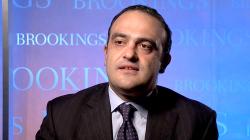Editor’s Note: The following issues paper, prepared by Domenico Lombardi for the High Level Panel on the Governance of the Financial Stability Board, provides detailed background on the history, decision-making process and organizational framework of the Financial Stability Board. This paper was discussed at a September 23 event at the Brookings Institution.
View the High-Level Panel’s recommendations »
INTRODUCTION—
At the height of the 2007–9 international financial crisis and following the Group of Twenty (G-20) summit in London in 2009, a new body—the Financial Stability Board (FSB)—was established as a successor to the Financial Stability Forum (FSF), with an expanded mandate to formulate and oversee the implementation of regulatory, supervisory and other financial sector policies. The FSB, which comprises an expanded membership, acts as a convening forum for national authorities responsible for financial stability in significant financial centers, central bankers, international financial institutions (IFIs), sector-specific international groupings of regulators and supervisors, and standard-setting bodies (SSBs).
Despite the importance of this recently established FSB, which has been described by U.S. Treasury Secretary Timothy Geithner as a new “fourth pillar” of the global economic governance architecture —alongside the International Monetary Fund, the World Bank and the World Trade Organization—there is extremely limited knowledge as to how the FSB operates and is governed. Against this background, the objective of this paper is to review relevant contributions, internal as well as external to the FSB, in order to provide input into the deliberations of the High-Level Panel on the Governance of the FSB.
This initiative is highly topical. At their recent meeting in Washington in April 2011, the G-20 finance ministers and central bank governors “welcomed the preliminary proposals of the FSB to strengthen its capacity, resources and governance including representativeness and asked the FSB to put forward formal proposals at its July meeting for review at [the G-20’s] next meeting.” Although completely independent of the FSB, the High-Level Panel’s initiative aims to provide input into the process led by the G-20.
The High-Level Panel on the Governance of the FSB is an independent initiative coordinated by the Brookings Institution and funded by U.S. Connect, and is part of a wider project bringing together three major institutions—the African Economic Research Consortium; New Rules for Global Finance, acting as overall coordinator; and the Brookings Institution—to examine and promote efforts to encourage effective, inclusive, transparent and accountable global regulation of the financial system.
This paper is structured as follows. The next section provides a historical overview of the FSB; the third section reviews the FSB’s mandate; the fourth section focuses on the FSB’s decisionmaking and its broader organizational framework, including its financial arrangements; the fifth section reviews the FSB’s accountability; the sixth section offers conclusions.
The Brookings Institution is committed to quality, independence, and impact.
We are supported by a diverse array of funders. In line with our values and policies, each Brookings publication represents the sole views of its author(s).



